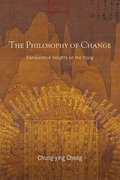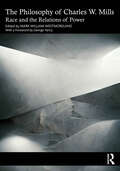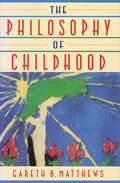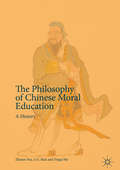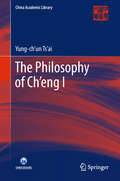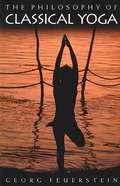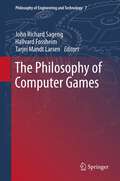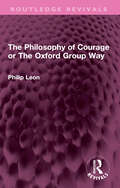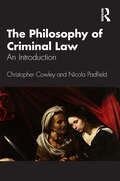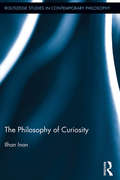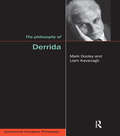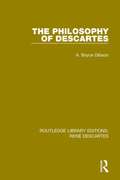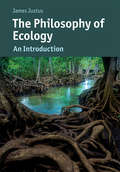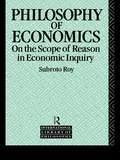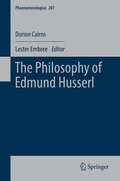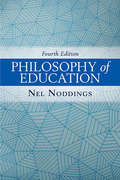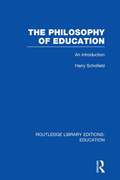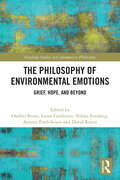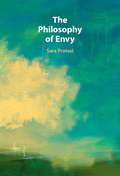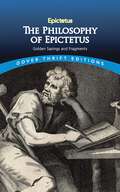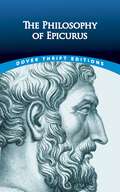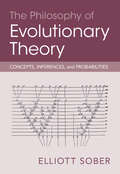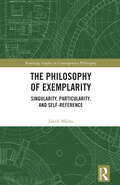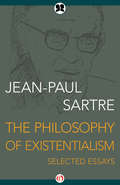- Table View
- List View
The Philosophy of Change: Comparative Insights on the Yijing
by Chung-ying ChengIn The Philosophy of Change, the distinguished scholar of Chinese philosophy Chung-ying Cheng advances our understanding of the Yijing by analyzing its philosophy in comparison to Western philosophical traditions. Cheng focuses on critically comparing philosophies of science, religion, and metaphysics in Leibniz, Whitehead, Neville, and Cobb alongside classical Chinese views on reality, divinity, knowledge, and morality. The book begins and ends with questions related to the character of Chinese metaphysical traditions, which contrast with the mainline metaphysical traditions found in Western Europe and North America. Cheng argues throughout the book that the philosophical underpinnings of basic concepts in Chinese culture are ultimately rooted in key claims found within the Yijing 易經 and one of its standard commentaries, the Yizhuan 易傳. The book serves as a complementary volume to the author's previous book, The Primary Way: Philosophy of the Yijing, which lays out a comprehensive and systematic philosophy based on the symbolism and text of the classical document and its traditional commentaries.
The Philosophy of Charles W. Mills: Race and the Relations of Power
by George Yancy Mark William WestmorelandCharles W. Mills (1951–2021) was considered by many to be the most well-known philosopher specializing in political philosophy and critical philosophy of race. This is the first collection of essays to critically examine the key themes of Mills’s philosophy across his major works.The chapters in this volume engage with major themes such as the racial contract, non-ideal theory, metaphysics of race, epistemology of ignorance, and corrective justice. They also explore Mills’s engagement with philosophical figures including Frederick Douglass, W. E. B. Du Bois, Maria Lugones, Immanuel Kant, Karl Marx, and John Rawls. Furthermore, the contributors seek to uncover unexplored terrain which may be illuminated by applying many of Mills’s key insights.The Philosophy of Charles W. Mills will be of interest to scholars and advanced students working in political philosophy, philosophy of race, Africana philosophy, and Black political thought.
The Philosophy of Childhood
by Gareth MatthewsSo many questions, such an imagination, endless speculation: the child seems to be a natural philosopher--until the ripe old age of eight or nine, when the spirit of inquiry mysteriously fades. What happened? Was it something we did--or didn't do? Was the child truly the philosophical being he once seemed? Gareth Matthews takes up these concerns in The Philosophy of Childhood, a searching account of children's philosophical potential and of childhood as an area of philosophical inquiry. Seeking a philosophy that represents the range and depth of children's inquisitive minds, Matthews explores both how children think and how we, as adults, think about them. Adult preconceptions about the mental life of children tend to discourage a child's philosophical bent, Matthews suggests, and he probes the sources of these limiting assumptions: restrictive notions of maturation and conceptual development; possible lapses in episodic memory; the experience of identity and growth as "successive selves," which separate us from our own childhoods. By exposing the underpinnings of our adult views of childhood, Matthews, a philosopher and longtime advocate of children's rights, clears the way for recognizing the philosophy of childhood as a legitimate field of inquiry. He then conducts us through various influential models for understanding what it is to be a child, from the theory that individual development recapitulates the development of the human species to accounts of moral and cognitive development, including Piaget's revolutionary model. The metaphysics of playdough, the authenticity of children's art, the effects of divorce and intimations of mortality on a child--all have a place in Matthews's rich discussion of the philosophical nature of childhood. His book will prompt us to reconsider the distinctions we make about development and the competencies of mind, and what we lose by denying childhood its full philosophical breadth.
The Philosophy of Chinese Moral Education: A History
by A. G. Rud Zhuran You Yingzi HuThe book depicts a unique historical and cultural phenomenon, the philosophy of Chinese moral education, in an attempt to capture the essence of Chinese culture. While tracing the historical journey of this philosophy, the book rearranges and interprets the conceptual frameworks concerning moral education in various Chinese philosophical schools and religions. In so doing, it summarizes the ideas of human relations, man and nature, cosmology, moral virtues, and educational approaches, posing intriguing questions about how they have influenced Chinese characteristics, social norms, and value orientations. In particular, the book brings up discussions on the culture of family and state, the challenges that the philosophy had encountered in early modern and present China, as well as the prospect of regeneration of the philosophy and its significance for our world today. This is the book to read if you want to have a deep understanding about China and its belief and educational system.
The Philosophy of Ch’eng I (China Academic Library)
by Yung-Ch’un Ts’aiThis book offers a comprehensive account of the great Neo-Confucian Master Cheng I (1033-1107), showing his philosophical ideas in a modern light. It systematically examines Cheng’s extensive literature and provides an ingenious interpretation of Cheng’s social and political views. The author, Yung-ch’un Ts’ai, was a respected scholar of sociology and theology in 20th century China.
The Philosophy of Classical Yoga
by Georg FeuersteinThis is the first comprehensive and systematic analytical study of the major philosophical concepts of classical yoga. The book consists of a series of detailed discussions of the key concepts used by Patanjali in his Yoga-Sutra to describe and explain the enigma of human existence and to point a way beyond the perpetual motion of the wheel of becoming. Feuerstein's study differs from previous ones in that it seeks to free Patanjali's aphoristic statements from the accretions of later interpretations; instead, the author places the Sutra in its original context and sees it as the source of the whole edifice of classical yoga and not just as a summary of previous developments. This book will be of interest to comparative religionists, Indologists, and practitioners of yoga who wish to deepen their understanding of its philosophical basis.
The Philosophy of Computer Games
by Tarjei Mandt Larsen John Richard Sageng Hallvard J FossheimComputer games have become a major cultural and economic force, and a subject of extensive academic interest. Up until now, however, computer games have received relatively little attention from philosophy. Seeking to remedy this, the present collection of newly written papers by philosophers and media researchers addresses a range of philosophical questions related to three issues of crucial importance for understanding the phenomenon of computer games: the nature of gameplay and player experience, the moral evaluability of player and avatar actions, and the reality status of the gaming environment. By doing so, the book aims to establish the philosophy of computer games as an important strand of computer games research, and as a separate field of philosophical inquiry. The book is required reading for anyone with an academic or professional interest in computer games, and will also be of value to readers curious about the philosophical issues raised by contemporary digital culture.
The Philosophy of Courage or The Oxford Group Way (Routledge Revivals)
by Philip LeonFirst Published in 1939 The Philosophy of Courage talks about Philip Leon’s personal experience of God in the language of philosophy. It is a book on philosophy but also a book based on personal experience. Leon was the first philosopher to attempt to talk about some of the most important principles of the Oxford Group, and hence the first philosopher to attempt to discuss some of the most important ideas underlying the twelve-step program. He discusses themes like true religion; undeniable facts; demonstration by experiment; spreading the world revolution; sin of depersonalisation; sex and marriage; and philosophy and art. This is an interesting read for scholars of religion, philosophy and theology.
The Philosophy of Criminal Law: An Introduction
by Christopher Cowley Nicola PadfieldThe Philosophy of Criminal Law: An Introduction explores the central concepts of criminal law, such as intention, complicity and duress, and how they work, both within criminal law practice and in our everyday lives, from legal and philosophical perspectives. At the heart of the book is the central philosophical concept of responsibility: what does it mean to be responsible for an act, to hold someone responsible for an act, or to give an excuse in order to avoid responsibility for an act? Offering talking points to enrich an ongoing conversation, this unique textbook addresses all of these questions in an accessible way for law and non-law students alike. Real cases are examined in detail and a critical approach to the criminal law is adopted throughout. The focus will be mainly on the criminal law of England and Wales, with occasional cases from other jurisdictions, and occasional examples from other areas of law. This text will be ideal reading for advanced undergraduate and graduate students of law, philosophy and criminology, as well as political science and sociology.
The Philosophy of Curiosity (Routledge Studies in Contemporary Philosophy)
by Ilhan InanIn this book, Ilhan Inan questions the classical definition of curiosity as a desire to know. Working in an area where epistemology and philosophy of language overlap, Inan forges a link between our ability to become aware of our ignorance and our linguistic aptitude to construct terms referring to things unknown. The book introduces the notion of inostensible reference (or reference to the unknown). Ilhan connects this notion to related concepts in philosophy of language: knowledge by acquaintance and knowledge by description; the referential and the attributive uses of definite descriptions; the de re/de dicto distinction; and Kripke’s distinction between rigid and accidental designators. Continuing with a discussion of the conditions for curiosity and its satisfaction, Inan argues that the learning process—starting in curiosity and ending in knowledge—is always an effort to transform our inostensible terms into ostensible ones. A contextual account is adopted for the satisfaction of curiosity. It then discusses the conditions of successful reference to the object of curiosity and its presuppositions. The book concludes with a discussion on the limits of curiosity and its satisfaction.
The Philosophy of Derrida (Continental European Philosophy Ser. #9)
by Mark Dooley Liam KavanaghFor more than forty years Jacques Derrida has attempted to unsettle and disturb the presumptions underlying many of our most fundamental philosophical, political, and ethical conventions. In The Philosophy of Derrida, Mark Dooley examines Derrida's large body of work to provide an overview of his core philosophical ideas and a balanced appraisal of their lasting impact. One of the author's primary aims is to make accessible Derrida's writings by discussing them in a vernacular that renders them less opaque and nebulous. Derrida's unusual writing style, which mixes literary and philosophical vocabularies, is shown to have hindered their interpretation and translation. Dooley situates Derrida squarely in the tradition of historicist, hermeneutic and linguistic thought, and Derrida's objectives and those of "deconstruction" are rendered considerably more convincing. While Derrida's works are ostensibly diverse, Dooley reveals an underlying cohesion to his writings. From his early work on Husserl, Hegel and de Saussure, to his most recent writings on justice, hospitality and cosmopolitanism, Derrida is shown to have been grappling with the vexed question of national, cultural and personal identity and asking to what extent the notion of a "pure" identity has any real efficacy. Viewed from this perspective Derrida appears less as a wanton iconoclast, for whom deconstruction equals destruction, but as a sincere and sensitive writer who encourages us to shed light on out historical constructions so as to reveal that there is much about ourselves that we do not know.
The Philosophy of Descartes (Routledge Library Editions: Rene Descartes #2)
by A. Boyce GibsonMaintaining that it is impossible to understand the work of a philosopher without understanding the previous history of thought and the contemporaneous developments, this book, originally published in 1932, is an in-depth study of Descartes’ philosophy with a strong emphasis on the historical approach. It covers Descartes’ early life and education, before continuing to discuss his method of doubt, the existence of God, the scientific interpretation of nature, the unity of knowledge, the attributes of God and free-will.
The Philosophy of Ecology: An Introduction (Cambridge Introductions to Philosophy and Biology)
by James JustusEcology is indispensable to understanding the biological world and addressing the environmental problems humanity faces. Its philosophy has never been more important. In this book, James Justus introduces readers to the philosophically rich issues ecology poses. Besides its crucial role in biological science generally, climate change, biodiversity loss, and other looming environmental challenges make ecology's role in understanding such threats and identifying solutions to them all the more critical. When ecology is applied and its insights marshalled to address these problems and guide policy formation, interesting philosophical issues emerge. Justus sets them out in detail, and explores the often ethically charged dimensions of applied ecological science, using accessible language and a wealth of scientifically-informed examples.
The Philosophy of Economics: On the Scope of Reason in Economic Inquiry (International Library of Philosophy)
by Subroto RoyThe first work to seriously and successfully bridge twentieth century economics and philosophy. Subroto Roy draws these two disciplines together and examines the intellectual roots of economics.
The Philosophy of Edmund Husserl
by Dorion Cairns Lester EmbreeThe present volume containing the dissertation of Dorion Cairns is the first part of a comprehensive edition of the philosophical papers of one of the foremost disseminators and interpreters of Husserlian phenomenology in North-America. Based on his intimate knowledge of Husserl's published writings and unpublished manuscripts and on the many conversations and discussions he had with Husserl and Fink during his stay in Freiburg i. Br. in 1931-1932 Cairns's dissertation is a comprehensive exposition of the methodological foundations and the concrete phenomenological analyses of Husserl's transcendental phenomenology.The lucidity and precision of Cairns's presentation is remarkable and demonstrates the secure grasp he had of Husserl's philosophical intentions and phenomenological distinctions. Starting from the phenomenological reduction and Husserl's Idea of Philosophy, Cairns proceeds with a detailed analysis of intentionality and the intentional structures of consciousness. In its scope and in the depth and nuance of its understanding, Cairns's dissertation belongs beside the writings on Husserl by Levinas and Fink from the same period.
The Philosophy of Education
by Nel NoddingsThe first edition of Nel Noddings' Philosophy of Education was acclaimed as the "best overview in the field" by the journal Teaching Philosophy and predicted to "become the standard textbook in philosophy of education" by Educational Theory. This classic text, originally designed to give the education student a comprehensive look at philosophical thought in relation to teaching, learning, research, and educational policy, has now been updated to reflect the most current thinking in the field. A revised chapter on Logic and Critical Thinking makes the topic more accessible to students and examines how critical thinking plays a role in light of the new Common Core standards. Philosophy of Education introduces students to the evolution of educational thought, from the founding fathers to contemporary theorists, with consideration of both analytic and continental traditions. This is an essential text not only for teachers and future teachers, but also for anyone needing a survey of contemporary trends in philosophy of education.
The Philosophy of Education
by NoddingsThe first edition of Nel Noddings’ Philosophy of Education was acclaimed as the "best overview in the field” by the journal Teaching Philosophy and predicted to "become the standard textbook in philosophy of education” by Educational Theory. This classic text, originally designed to give the education student a comprehensive look at philosophical thought in relation to teaching, learning, research, and educational policy, has now been updated to reflect the most current thinking in the field. A revised chapter on Logic and Critical Thinking makes the topic more accessible to students and examines how critical thinking plays a role in light of the new Common Core standards. Philosophy of Education introduces students to the evolution of educational thought, from the founding fathers to contemporary theorists, with consideration of both analytic and continental traditions. This is an essential text not only for teachers and future teachers, but also for anyone needing a survey of contemporary trends in philosophy of education.
The Philosophy of Education: An Introduction (Routledge Library Editions: Education)
by Harry SchofieldThere are many students who find philosophy of education difficult, because they have never received teaching in the basic essentials of general philosophy. This book begins by asking the basic question ‘what is philosophy?’ and examines a number of possible answers. Step by step the reader is introduced to the modern techniques of linguistic and concept analysis. Whenever a technical term is used it is explained and illustrated by reference to familiar situations in everyday life.
The Philosophy of Environmental Emotions: Grief, Hope, and Beyond (Routledge Studies in Contemporary Philosophy)
by Niklas Forsberg Laura Candiotto Ondřej Beran Antony Fredriksson David RozenThis volume presents new philosophical perspectives on environmental emotions. It explores the motivating nature of emotions such as anger, grief, and hope in relation to the current climate crisis.Many of our emotional responses to the climate crisis take a distressed form like anxiety, despair, or grief. However, these emotions almost always coexist with hope, a drive toward action, or a strengthened sense of relationality and belonging. This book explores the different levels at which these tensions take place. Part I discusses the conceptual and linguistic notions we use to make sense of our ecological predicament. Part II looks at the embedded dimension of our emotions: how we feel about the climate crisis as members of our communities and how our emotions are interconnected with what we do and how we work in and for our communities. Several chapters in this section explicitly discuss hope. Finally, Part III has a phenomenological and existential focus: it explores the nature of the rootedness and how it shapes our emotional experiences during the climate crisis.The Philosophy of Environmental Emotions will appeal to scholars and graduate students working in environmental philosophy, philosophy of emotion, and environmental psychology.
The Philosophy of Envy
by Sara ProtasiEnvy is almost universally condemned and feared. But is its bad reputation always warranted? In this book, Sara Protasi argues that envy is more multifaceted than it seems, and that some varieties of it can be productive and even virtuous. Protasi brings together empirical evidence and philosophical research to generate a novel view according to which there are four kinds of envy: emulative, inert, aggressive, and spiteful. For each kind, she individuates different situational antecedents, phenomenological expressions, motivational tendencies, and behavioral outputs. She then develops the normative implications of this taxonomy from a moral and prudential perspective, in the domain of personal loving relationships, and in the political sphere. A historical appendix completes the book. Through a careful and comprehensive investigation of envy's complexity, and its multifarious implications for human relations and human value, The Philosophy of Envy surprisingly reveals that envy plays a crucial role in safeguarding our happiness.
The Philosophy of Epictetus: Golden Sayings and Fragments
by Epictetus"Wealth consists not in having great possessions, but in having few wants.""There is only one way to happiness and that is to cease worrying about things which are beyond the power of our will.""Is there smoke in the room? If it be slight, I remain; if grievous, I quit it. For you must remember this and hold it fast, that the door stands open."A leading thinker of the Stoic school of philosophy, Epictetus (A.D. 55–135) was a renowned teacher whose students transcribed and compiled his teachings; this collection presents the work of Arrian, a Greek philosopher and historian who was a disciple of Epictetus. In these two brief but highly influential works, Epictetus demonstrates that philosophy is more than a theoretical discipline; it is a way of life based on logic, reason, and self-reflection. His examination of the nature of fate and man's place in the universe explores the distinction between what is and is not within our power, the meaning of good and evil, how we should live, and many other timeless issues.
The Philosophy of Epicurus: Letters, Doctrines, And Parallel Passages From Lucretius (Dover Thrift Editions)
by EpicurusDespite its modern-day connotations of hedonism, "Epicureanism" has more to do with living a mindful, uncomplicated life. Epicurus — who was born at Samos, Greece, in 341 BC and died at Athens in 270 BC — founded a school of philosophy that focused on maximizing simple pleasures and minimizing pain, such as the irrational fear of death. "Death is nothing to us," declared Epicurus, "since when we are, death has not come, and when death has come, we are not." The philosopher did not believe that humans would be punished for their sins after death, and he stressed the lifelong search for lasting pleasures: tranquility, friendship, and philosophical inquiry. Although Epicurus was a prolific author, very few of his writings have survived. This volume, edited and translated by George K. Strodach, features three important letters and a collection of observations preserved by the biographer of ancient philosophers, Diogenes Laertius. Students of philosophy and ancient history will appreciate this compilation of Epicurus's enduring wisdom.
The Philosophy of Evolutionary Theory: Concepts, Inferences, and Probabilities
by Elliott SoberNatural selection, mutation, and adaptation are well-known and central topics in Darwin's theory of evolution and in the 20th - and 21st -century theories which grew out of it, but many other important topics are used in evolutionary biology that raise interesting philosophical questions. In this book, Elliott Sober analyses a much larger range of topics, including fitness, altruism, common ancestry, chance, taxonomy, phylogenetic inference, operationalism, reductionism, conventionalism, null hypotheses and default reasoning, instrumentalism versus realism, hypothetico-deductivism, essentialism, falsifiability, the principle of parsimony, the principle of the common cause, causality, determinism versus indeterminism, sensitivity to initial conditions, and the knowability of the past. Sober's clear philosophical analyses of these key concepts, arguments, and methods of inference will be valuable for all readers who want to understand evolutionary biology in both its Darwinian and its contemporary forms.
The Philosophy of Exemplarity: Singularity, Particularity, and Self-Reference (Routledge Studies in Contemporary Philosophy)
by Jakub MáchaThis book offers an original philosophical perspective on exemplarity. Inspired by Wittgenstein’s later work and Derrida’s theory of deconstruction, it argues that examples are not static entities but rather oscillate between singular and universal moments. There is a broad consensus that exemplary cases mediate between singular instances and universal concepts or norms. In the first part of the book, Mácha contends that there is a kind of différance between singular examples and general exemplars or paradigms. Every example is, in part, also an exemplar, and vice versa. Furthermore, he develops a paracomplete approach to the logic of exemplarity, which allows us to say of an exemplar of X neither that it is an X nor that it is not an X. This paradox is structurally isomorphic to Russell’s paradox and can be addressed in similar ways. In the second part of the book, Mácha presents four historical studies that exemplify the ideas developed in the first part. This part begins with Plato’s Forms, understood as standards/paradigms, before considering Kant’s theory of reflective judgment as a general epistemological account of exemplarity. This is then followed by analyses of Hegel’s conceptual moment of particularity and Kuhn’s concept of paradigm. The book concludes by discussing the speculative hypothesis that all our knowledge is based on paradigms, which, following the logic of exemplarity, are neither true nor false. The Philosophy of Exemplarity will be of interest to scholars and advanced students working in philosophy of language, logic, history of philosophy, and literary theory.
The Philosophy of Existentialism
by Jean-Paul SartreA collection of essays by Jean-Paul Sartre that touch upon the subject of existentialism by looking at aesthetics, emotions, writing, phenomenology, and perception The Philosophy of Existentialism collects representative essays on Jean-Paul Sartre's pioneering subject: existentialism. Beginning with a thoughtful introduction by fellow French philosopher Jean Wahl, this worklooks at existentialism through several lenses, exploring topics such as the emotions, imagination, nothingness, freedom, responsibility, and the desire to be God. By providing exposition on a variety of subjects, The Philosophy of Existentialism is a valuable introduction to Sartre's ideas.
